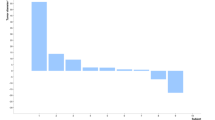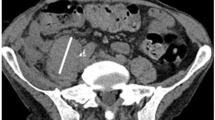Abstract
We conducted a phase 1 trial of direct injection of an E1,E3-deleted adenovirus encoding interleukin-2 (AdCAIL-2) into subcutaneous deposits of melanoma or breast cancer. Twenty-three patients were injected at seven dose levels (107–1010 p.f.u). Local inflammation was observed at the site of injection in 60% of patients, but side-effects were otherwise minor. Incomplete local tumor regression occurred at the site of injection in 24% of patients, but no conventional clinical responses were seen. Circulating CD4 and CD8 counts fell significantly 24 h after injection. Post-injection biopsies demonstrated tumor necrosis and lymphocytic infiltration with the predominant tumor-infiltrating cells both CD3- and CD8-positive. Vector-derived sequences were detected in 14 of 18 biopsies examined 7 days after injection and vector-derived hIL-2 mRNA was detected in 80% of 7-day biopsies processed after injection of 108 p.f.u. of AdCAIL-2 or higher. While IL-2 was detectable by ELISA in tumor biopsies at 48 h, no protein was detectable in injected tumors after 7 days and no circulating IL-2 was detectable at any time-point. No Ad5E1 sequences were detected either before or after injection indicating absence of replication-competent virus or endogenous E1-like sequence; furthermore, only rare vector shedding was detected. Anti-adenovirus and neutralizing antibody titers were elevated 1 month after injection in all patients. This trial therefore confirms the safety of use of adenoviral vectors for gene delivery in humans and demonstrates successful transgene expression even in the face of pre-existing immunity to adenovirus.
This is a preview of subscription content, access via your institution
Access options
Subscribe to this journal
Receive 12 print issues and online access
$259.00 per year
only $21.58 per issue
Buy this article
- Purchase on Springer Link
- Instant access to full article PDF
Prices may be subject to local taxes which are calculated during checkout












Similar content being viewed by others
References
Rosenberg SA et al. Human gene marker/therapy clinical protocols Hum Gene Ther 1997 8: 2301–2338
Zhai Y et al. Antigen-specific tumor vaccines. Development and characterization of recombinant adenoviruses encoding MART1 or gp100 for cancer therapy J Immunol 1996 156: 700–710
Stewart AK et al. A phase I study of adenovirus-mediated gene transfer of interleukin 2 cDNA into metastatic breast cancer or melanoma Hum Gene Ther 1997 8: 1403–1414
Toloza EM et al. In vivo cancer gene therapy with a recombinant interleukin-2 adenovirus vector Cancer Gene Ther 1996 3: 11–17
Sewell DA et al. Safety of in vivo adenovirus-mediated thymidine kinase treatment of oral cancer Arch Otolaryngol Head Neck Surg 1997 123: 1298–1302
Santoso JT et al. Adenovirus-based p53 gene therapy in ovarian cancer (see comments) Gynecol Oncol 1995 59: 171–178
Gahery-Segard H et al. Phase I trial of recombinant adenovirus gene transfer in lung cancer. Longitudinal study of the immune responses to transgene and viral products J Clin Invest 1997 100: 2218–2226
Esandi MC et al. Gene therapy of experimental malignant mesothelioma using adenovirus vectors encoding the HSVtk gene Gene Therapy 1997 4: 280–287
Graham FL, Prevec L . Adenovirus expression vectors and recombinant vaccines. In: Ellis RW (ed) . Vaccines: New Approaches to Immunological Problems Butterworth-Heinemann: Boston 1992 364–390
Gahery-Segard H et al. Immune response to recombinant capsid proteins of adenovirus in humans: antifiber and anti-penton base antibodies have a synergistic effect on neutralizing activity J Virol 1998 72: 2388–2397
Clayman GL et al. Adenovirus-mediated p53 gene transfer in patients with advanced recurrent head and neck squamous cell carcinoma J Clin Oncol 1998 16: 2221–2232
Rosenberg SA . Keynote address: perspectives on the use of interleukin-2 in cancer treatment Cancer J Sci Am 1997 3 (Suppl. 1): S2–S6
Fearon ER et al. Interleukin-2 production by tumor cells bypasses T helper function in the generation of an antitumor response Cell 1990 60: 397–403
Gansbacher B, Rosenthal FM, Zier K . Retroviral vector-mediated cytokine-gene transfer into tumor cells Cancer Invest 1993 11: 345–354
Porgador A et al. Anti-metastatic vaccination of tumor-bearing mice with IL-2-gene-inserted tumor cells Int J Cancer 1993 53: 471–477
Zier KS, Salvadori S, Cronin KC, Gansbacher B . Vaccination with IL-2-secreting tumor cells stimulates the generation of IL-2-responsive T cells and prevents the development of unresponsiveness Cancer Gene Ther 1994 1: 43–50
Rosenthal FM et al. Augmentation of antitumor immunity by tumor cells transduced with a retroviral vector carrying the interleukin-2 and interferon-gamma cDNAs Blood 1994 83: 1289–1298
Alosco T et al. Antitumor response independent of functional B or T lymphocytes induced by the local and sustained release of interleukin-2 by the tumor cells Cancer Immunol Immunother 1993 36: 364–372
Tsai SC et al. Induction of antitumor immunity by interleukin-2 gene-transduced mouse mammary tumor cells versus transduced mammary stromal fibroblasts J Natl Cancer Inst 1993 85: 546–553
Bannerji R, Arroyo CD, Cordon-Cardo C, Gilboa E . The role of IL-2 secreted from genetically modified tumor cells in the establishment of antitumor immunity J Immunol 1994 152: 2324–2332
Lindauer M et al. Immune reactions induced by interleukin-2 transfected colorectal cancer cells in vitro: predominant induction of lymphokine-activated killer cells J Mol Med 1996 74: 43–49
Iwanuma Y, Kato K, Yagita H, Okumura K . Induction of tumor-specific cytotoxic T lymphocytes and natural killer cells by tumor cells transfected with the interleukin-2 gene Cancer Immunol Immunother 1995 40: 17–23
Haddada H et al. Adenoviral interleukin-2 gene transfer into P815 tumor cells abrogates tumorigenicity and induces anti-tumoral immunity in mice Hum Gene Ther 1993 6: 703–711
Addison CL et al. Intratumoral injection of an adenovirus expressing interleukin 2 induces regression and immunity in a murine breast cancer model Proc Natl Acad Sci USA 1995 92: 8522–8526
Addison CL et al. Intratumoral co-injection of adenoviral vectors expressing IL-2 and IL-12 results in enhanced frequency of regression of injected and untreated distal tumors Gene Therapy 1998 5: 1400–1409
Mittereder N et al. Evaluation of the efficacy and safety of in vitro, adenovirus-mediated transfer of the human cystic fibrosis transmembrane conductance regulator cDNA Hum Gene Ther 1994 5: 717–729
Rosenecker J et al. Adenovirus infection in cystic fibrosis patients: implications for the use of adenoviral vectors for gene transfer Infection 1996 24: 5–8
Zabner J et al. Repeat administration of an adenovirus vector encoding cystic fibrosis transmembrane conductance regulator to the nasal epithelium of patients with cystic fibrosis J Clin Invest 1996 97: 1504–1511
Yang Y, Greenough K, Wilson JM . Transient immune blockade prevents formation of neutralizing antibody to recombinant adenovirus and allows repeated gene transfer to mouse liver Gene Therapy 1996 3: 412–420
Bramson JL, Hitt M, Gauldie J, Graham FL . Pre-existing immunity to adenovirus does not prevent tumor regression following intratumoral administration of a vector expressing IL-12 but inhibits virus dissemination Gene Therapy 1997 4: 1069–1076
Tursz T et al. Phase I study of a recombinant adenovirus-mediated gene transfer in lung cancer patients J Natl Cancer Inst 1996 88: 1857–1863
Marr RA et al. Tumour immunotherapy using an adenoviral vector expressing a membrane- bound mutant of murine TNF alpha Gene Therapy 1997 4: 1181–1188
Bramson JL et al. Direct intratumoral injection of an adenovirus expressing interleukin-12 induces regression and long-lasting immunity that is associated with highly localized expression of interleukin-12 Hum Gene Ther 1996 7: 1995–2002
Putzer BM et al. Interleukin-12 and B7–1 costimulatory molecule expressed by an adenovirus vector act synergistically to facilitate tumor regression Proc Natl Acad Sci USA 1997 94: 10889–10894
Author information
Authors and Affiliations
Rights and permissions
About this article
Cite this article
Stewart, A., Lassam, N., Quirt, I. et al. Adenovector-mediated gene delivery of interleukin-2 in metastatic breast cancer and melanoma: results of a phase 1 clinical trial. Gene Ther 6, 350–363 (1999). https://doi.org/10.1038/sj.gt.3300833
Received:
Accepted:
Published:
Issue Date:
DOI: https://doi.org/10.1038/sj.gt.3300833
Keywords
This article is cited by
-
Adenoviral Delivery of Tumor Necrosis Factor-α and Interleukin-2 Enables Successful Adoptive Cell Therapy of Immunosuppressive Melanoma
Molecular Therapy (2016)
-
Intralesional Adenovirus-mediated Interleukin-2 Gene Transfer for Advanced Solid Cancers and Melanoma
Molecular Therapy (2008)
-
Technical hurdles in a pilot clinical trial of combined B7-2 and GM-CSF immunogene therapy for glioblastomas and melanomas
Journal of Neuro-Oncology (2006)



